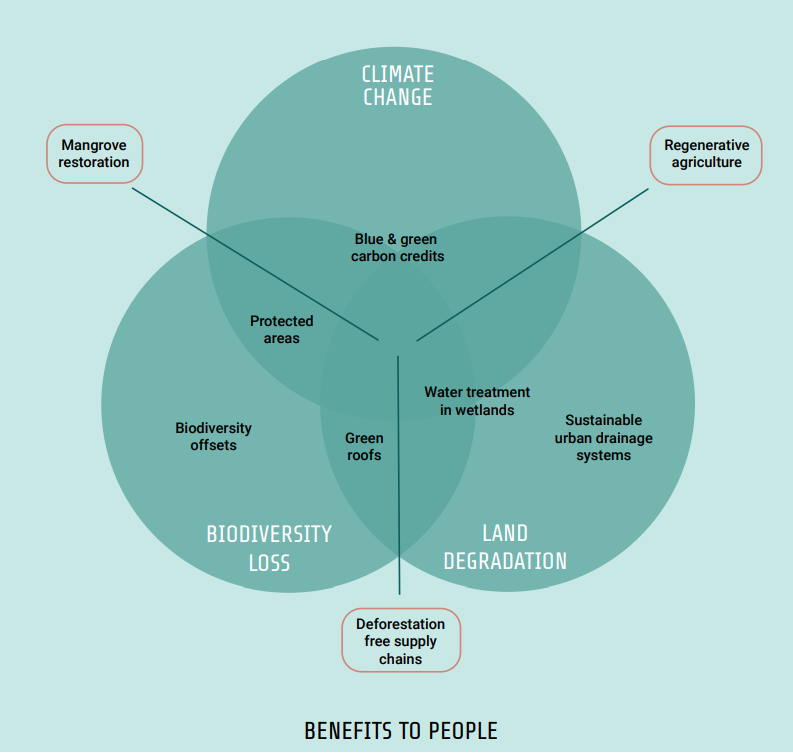Biodiversity & Environment
State of Finance for Nature Report
- 03 Dec 2022
- 6 min read
For prelims: Nature-based Solutions (NbS), State of Finance for Nature Report, UN Environment Programme, NbS, Sustainable Development Goals, Paris Agreement on Climate Change,
For Mains: Nature-based Solutions (NbS), Environmental Pollution & Degradation
Why in News?
Recently, the second edition of the State of Finance for Nature report was released.
- The report was released jointly by the UN Environment Programme (UNEP) along with the Economics of Land Degradation initiative of the Federal Ministry for Economic Cooperation and Development (BMZ) of Germany, the United Nations Convention to Combat Desertification (UNCCD) and the European Commission.
What are the Findings of the Report?
- Current Financial Flows:
- Current public and private financial flows to NbS are estimated to be USD 154 billion per year.
- Public funds make up 83% of the total and the private sector contributes approximately 17%.
- Current public and private financial flows to NbS are estimated to be USD 154 billion per year.
- Changes in NbS Finance Flows:
- Total finance flows to NbS have increased by USD 3.9 billion from USD 150 billion (SFN 2021) to USD 154 billion per year.
- This represents year-on-year growth in investment of 2.6% in real terms across the sum of public and private financial flows.
- Investment in Marine NbS and Protected Areas:
- SFN 2022 broadened the scope by including marine nature-based solutions and detailed assessment of protected area finance.
- Finance flows to marine NbS are roughly USD 14 billion, 9% of total (terrestrial and marine).
- Annual domestic government expenditure in marine NbS is over USD 10 billion per year, including spending on marine protected areas, sustainable management of fisheries and research and development of fisheries.
- Nature-negative Financial Flows:
- Public financial support for nature-negative activities ranges from USD 500 to 1,100 billion per year at present, which is three to seven times larger than current investments in NbS.
What are the Recommendations?
- Investment in Nature Based Solution:
- Without an increase in investments in nature-based solutions to USD 384 billion/year by 2025, the goals of climate change, biodiversity, and land degradation will not be met.
- There is a need to double the funding for NbS and reduce it for activities that increase Greenhouse Gas Emissions (GHG).
- Private Investments:
- Private sector actors will have to combine ‘net zero’ with ‘nature positive’.
- For this, private companies must create a sustainable supply chain, reduce activities that negatively impact climate and biodiversity, offset any unavoidable activities through high-integrity nature markets, pay for ecosystem services and invest in nature-positive activities.
- Increase Inclusion in Financial Systems:
- In order to scale up NbS investments, public and private sectors must incorporate just transition principles that safeguard human rights.
- A Just Transition involves maximizing the social and economic opportunities of climate action, while minimizing and carefully managing any challenges – including through effective social dialogue among all groups impacted, and respect for fundamental labour principles and rights.
- In order to scale up NbS investments, public and private sectors must incorporate just transition principles that safeguard human rights.
What is Nature-based Solution(NbS)?
- The NbS refers to sustainable management and use of nature to tackle socio-environmental challenges, which range from disaster risk reduction, climate change and biodiversity loss to food and water security as well as human health.
- NbS creates harmony between people and nature, enables ecological development and represents a holistic, people-centred response to climate change.
- Thus, NbS underpin the Sustainable Development Goals, as they support vital ecosystem services, biodiversity, and access to fresh water, improved livelihoods, healthy diets and food security (organic agriculture) from sustainable food systems.
- Also, NbS are an essential component of the overall global effort to achieve the goals of the Paris Agreement on Climate Change.
What is the United Nations Environment Programme?
- About: The UNEP is a leading global environmental authority established on 5th June 1972.
- Functions: It sets the global environmental agenda, promotes the sustainable development within the United Nations system, and serves as an authoritative advocate for global environment protection.
- Major Reports: Emission Gap Report, Adaptation Gap Report, Global Environment Outlook, Frontiers, Invest into Healthy Planet.
- Major Campaigns: Beat Pollution, UN75, World Environment Day, Wild for Life.
- Headquarters: Nairobi, Kenya.
UPSC Civil Services Examination Previous Year Question (PYQ)
Q. The ‘Common Carbon Metric’, supported by UNEP, has been developed for
(a) assessing the carbon footprint of building operations around the world
(b) enabling commercial fanning entities around the world to enter carbon emission trading
(c) enabling governments to assess the overall carbon footprint caused by their countries
(d) assessing the overall carbon foot-print caused by the use of fossil fuels by the world in a unit time
Ans: (a)






-min.jpg)